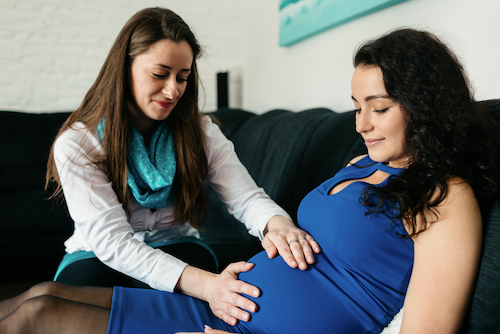If you are an expat and pregnant in Hungary, your maternity care and cover will depend on whether you are registered with the Hungarian public health system. You will be covered under the Országos Egészségpénztár Penztar (OEP) if you and your employer have been making contributions into the national insurance scheme (HIF).You will also be able to access the private sector by making out-of-pocket payments or if you are covered by your own private health insurance and have provision within your policy for maternity care. Public healthcare in Hungary is varied in terms of quality and provision, and many expats opt for private insurance. We will look at some of your options below.
How to decide on a birth plan
A birth plan is a list of what you would like to have happen in labour and beyond, written so that your doctor know what your wishes and expectations might be. Some elements to think about include:
• where do you want to give birth?
• who do you want to have with you (e.g. your partner)?
• what kind of birth do you want (e.g. vaginal birth or a Caesarian)
• do you need any birthing aids?
• do you want pain relief, and if so, what kind?
• what kind of birthing environment would you prefer?
Labour in Hungary is medicalised and procedures such as episiotomies and the use of oxytocin are commonplace: if you do not want such procedures you should make your views known to your midwife or obstetrician well in advance of the birthing process.
Hungarian maternity care
If you have confirmed your pregnancy with your GP, you will then need to contact your local health visitor. They will issue you with a booklet detailing your maternity care and should also give you a book (Kiskönyv) which will contain the medical history of your pregnancy. You must take this with you to all your medical appointments during the course of the pregnancy, and to the hospital when you go into labour. You may also need it when applying for any subsequent maternity benefits or grants.

Under the HIF you should be eligible for the following procedures:
• 4 ultrasound scans: during your first visit, then at 12 weeks, 30 weeks, and 36 weeks
• 4 blood tests
• a urine test
• a pap smear
• amniocentesis
Some pre-natal classes may be available but you will probably only be likely to access such classes in English in the capital: the group Budapest Moms, for example, run pre and post natal classes, such as mother and baby swimming classes.
You will not be able to have a home birth under the public healthcare system and midwives are not licensed to attend home births. More alternative forms of maternity and labour care, such as birthing pools, are not common throughout Hungary. Public provision tends to be basic.

When you are admitted to a public hospital for labour, you will need to bring:
• parents’ ID cards or passports
• Kiskönyv booklet
• parents’ marriage certificate
You should also check whether your partner is allowed in the birthing ward with you; the father may not, for example, be allowed to remain with you in the event of a Caesarian. You will not have a private room under the national healthcare system.
Hungarian maternity provision varies in terms of quality depending on your institution, but public maternity care is reported as not being of a high standard. More than 60% of women report having to make so-called ‘gratitude’ payments to doctors in order to access a reasonable level of care: an informal system also known as parasolvency.
Surveys have shown that patients who made such informal payments received a higher level of care than those who did not. In addition, some report doctors as recommending procedures which are not strictly medically necessary at extra cost. Women who want a chosen obstetrician or gynecologist present at the birth in a public hospital may have to pay extra to do so.

Maternity providers in the region are reported as being trained with outdated curricula and training materials.
If you are covered by the HIF, you will be entitled to maternity cover, and here Hungary rates more highly in international rankings with comparatively generous maternity provision. Maternity leave in Hungary is 410 days, 45 of which are used before the birth. When the child reaches six months, if the mother consents, the leave can be transferred to the father for the rest of the period.
During these 410 days, social security beneficiaries who have worked at least 12 months prior to taking the maternity leave are paid an allowance of 90% of their gross salary by the HIF. Fathers are eligible for 15 days’ paternity leave.
As of 2019, eligible mothers will be entitled to a maximum of 208,600 forints (€649) a month in maternity benefits. The government has been due to introduce maternity benefits for university students or graduates and introduce a new subsidy for parents who care for permanently sick children at home.

At the end of maternity leave (szülési szabadság) you will be entitled to parental cover (szülői szabadság) until your child is two.
You can also opt for private care at one of the ‘baby friendly’ private hospitals (bababarát kórház) who are campaigning to increase the provision of breastfeeding areas throughout the country. Private maternity cover will give you additional comfort throughout the birthing process, such as a private room, and private sector providers in Hungary are also able to invest in more sophisticated medical technology.
Will the baby be a Hungarian citizen?
Your child will not acquire Hungarian citizenship simply by being born in the country: one parent at least will need to be a Hungarian citizen for this to apply. However, if one of the child’s ancestors was Hungarian, then the child may be eligible for simplified naturalization, which takes a few months to accomplish.
Would you like to share your experience of life abroad with other readers? Answer the questions here to be featured in an interview!

